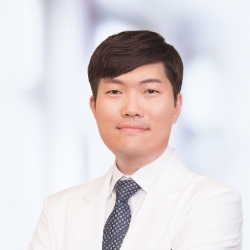
Wonbin Kim
Seoul National University Hospital, Republic of KoreaPresentation Title:
Establishment of a new treatment system using QR cords in taping patient experience
Abstract
Introduction: During the initial surge of coronavirus disease 2019 (COVID-19), which is sensitive to the spread of infectious diseases in the military, made it difficult to access medical care. Thus, we thought about how to use non-face-to-face medical care using digital devices. This study was undertaken to establish a new treatment system using QR cords in taping patient experience in military medical care.
Methods: We selected the 15 most common musculoskeletal diseases in the military based on medical records in military hospitals. Taping videos were produced for 15 diseases, and 14 additional "taping brochures for each disease" were also developed by supplementing the deficiencies in the video. The contents were organized based on taping books and papers, and the focus was on portability and readability. And in this cross-sectional study, we assessed a total of 160 patients (150 males and 10 females; average age 20.6±3.8 years) who underwent pain in musculoskeletal. All patients were surveyed on the knowledge and satisfaction of taping contents before and after taping education through QR code in mobile phone.
Results: Taping knowledge was 2.95 points out of 5 points, but it imporved to 4.04 points out of 5 points. The items with the largest increase in the range of scores compared to the pre-level in taping knowledge are "Taping works to relieve pain by lifting the epidermis of the skin to promote blood circulation" and "It dries naturally when taping is wet and can be used for 3 to 5 days." And taping satisfaction improved from 3.82 to 4.32 points out of 5 points. The most popular taping contents by patients in three months were ankle sprain taping, followed by round shoulder and knee pain. This result correlated with the most prevalent musculoskeletal disease in the military.
Biography
Dr. Kim studied rehabilitation medicine in Jeju National University of Hospital in 2017. He then joined the military at the army forces of Chuncheon Hospital (Korean Government requires male citizens to perform compulsory military service for 3 years.) After his fellowship supervised by Professor Dr. Kim Keewon at the Seoul National University of Hospital.

